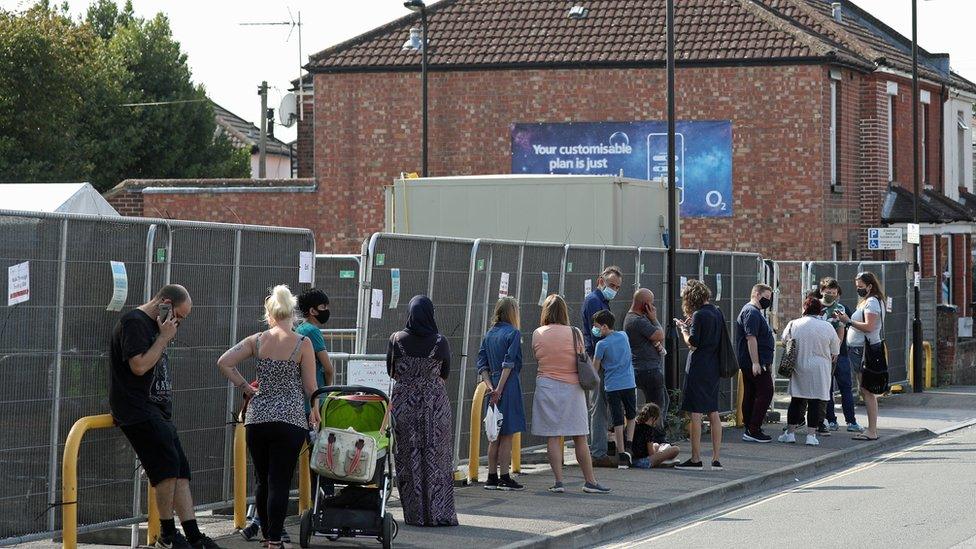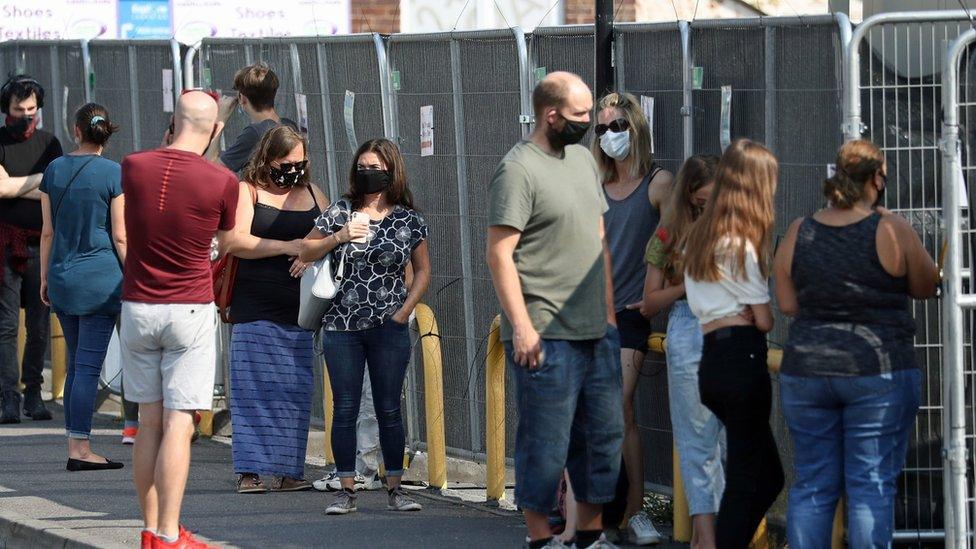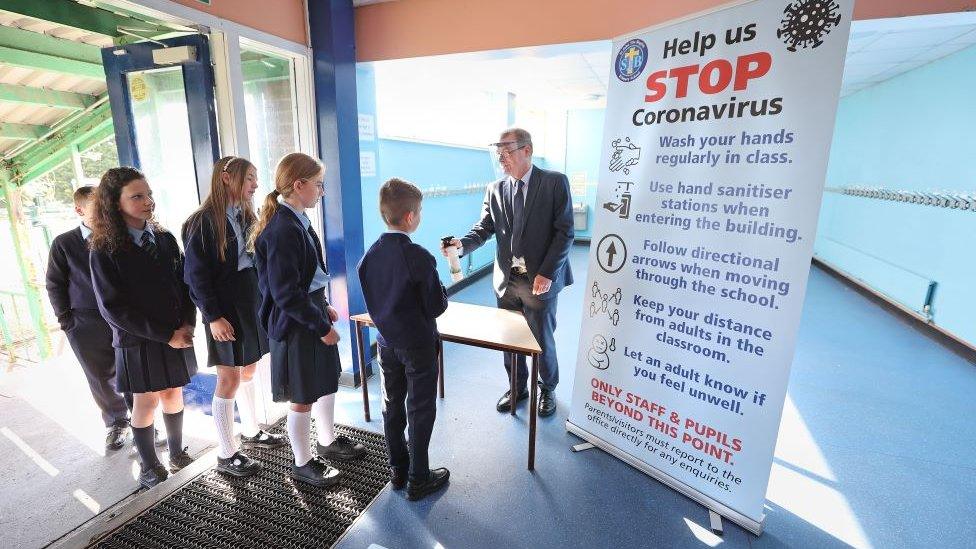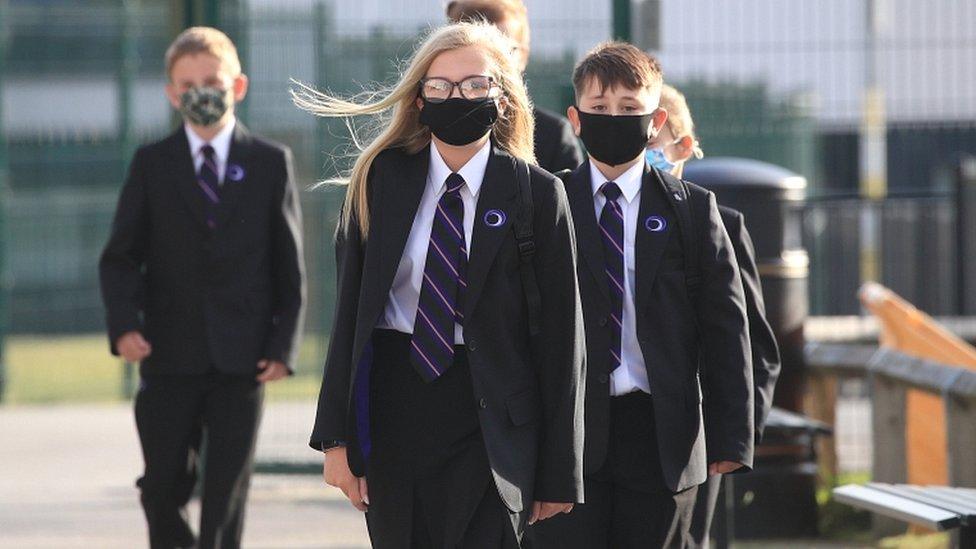Coronavirus: 'Booking a test is like getting Harry Potter tickets'
- Published
Demand for coronavirus tests has surged since pupils returned to schools, with many staff and students unable to tell a winter bug from the pandemic virus. How are teachers and heads coping with the disruption?
William Lau, a computer science teacher at Central Foundation Boys' School in North London, knew how important it was to get a test when his two-year-old daughter developed a fever at 3am on Tuesday.
He did not want students, who had already faced so much disruption to their education, to have any less time with a specialist teacher. And he did not want his own seven-year-old son to miss more school.
"We have just come out of six months of lockdown where students haven't had access to education. I teach in a school with quite high social deprivation. A lot of the students don't have computers at home they can do computer science work on," he said.
So he began trying to book a test in the early hours of the morning, then set an alarm to carry on at 07:00 BST, searching online for tips on where and when to try booking for the best results.
After 11 hours of trying, he eventually found a test booking, but he said the website made it especially hard, repeatedly losing the details he had entered and sending him back to the beginning of the booking process.
"It's highly reliant on the user being persistent and just refreshing, refreshing, refreshing, like you're trying to book Harry Potter tickets."

Queues have built up outside some testing centres
Nicole, in Sheffield, is a teacher of children with special needs and said she has to self-isolate while waiting for test results for her two children. Leaving vulnerable children who had missed months of school without their usual teacher brought her close to tears.
She told BBC Radio 5 Live Breakfast: "I'm desperate to be in with them because I want to do the right thing for them."
Nicole said she thought the government should have been better prepared. "You don't have to be Chris Whitty or Jenny Harries" to know that there would be symptoms of colds, flu and coronavirus in schools this year, she said.
She said: "Vulnerable children are being hung out to dry. I just think my report card is 'could hugely do better'."
'Predictable'
School leaders estimate that around 740 schools in England have sent home some pupils, whether it's a bubble, a year group or multiple year groups, said Steve Chalke, the founder of the Oasis trust. Eight out of his trust's 52 schools have been affected.
He said one parent called him "in tears" after spending days trying to book a test for her child with special needs, only to be offered one that she could not reach without a car.
Mr Chalke said this was the "predictable" result of focusing on returning students to school physically, and said the government needed a plan to support remote learning for everyone during these disruptions.
Mark Tilling, head teacher of High Tunstall School in Hartlepool, said his school had limited the number of pupils self-isolating to just half a dozen because the local public health teams had helped to establish who had been in contact with the school's one positive case.
But he told BBC Radio 4's the World At One he had run out of the 10 testing kits provided for his 1,257-pupil school. They had ordered more, but it was not clear how many they would get or when they would arrive.

Steve Chalke, who founded a chain of academies, said the government should have been preparing for remote learning
Emma Knights, chief executive of the National Governance Association, said the disruption of education is "beginning to get up a head of speed".
"Just at the beginning of term there are a lot of bugs brought back and trying to work out what is Covid and what definitely isn't is not a decision that a head teacher can make," she said.
Schools were promised it would be "as easy as possible" to get a test and that public health teams would carry out a "rapid risk assessment" of any suspected cases, to ensure that staff and pupils could isolate if needed without unnecessary disruption.
But she says this is not happening in all schools, so they do not know who has Covid-19 and who has been in close contact with them.
'Lockdown by default'
Head teachers' unions said they had received hundreds of emails from schools describing staff and pupils struggling to access tests and being given contradictory advice.
Geoff Barton, ASCL general secretary, told BBC Radio 4's Today programme that without testing to cut short the self-isolation period for those who are negative, staff absence could be "unsustainable" and it would feel like "lockdown by default".
One primary school in Exeter told the NAHT that three staff who were self-isolating were offered tests a seven-hour drive away.
And at a school in Northern Ireland one staff member was told to self-isolate for 14 days even if the test was negative, while another was told they only needed to self-isolate for seven days if it was positive.
Paul Whiteman, general secretary for the NAHT head teachers' union, said: "The government assured us that this would be ready, but at the first sign of stress it seems to be falling over."
- Published16 September 2020

- Published16 September 2020

- Published15 September 2020
